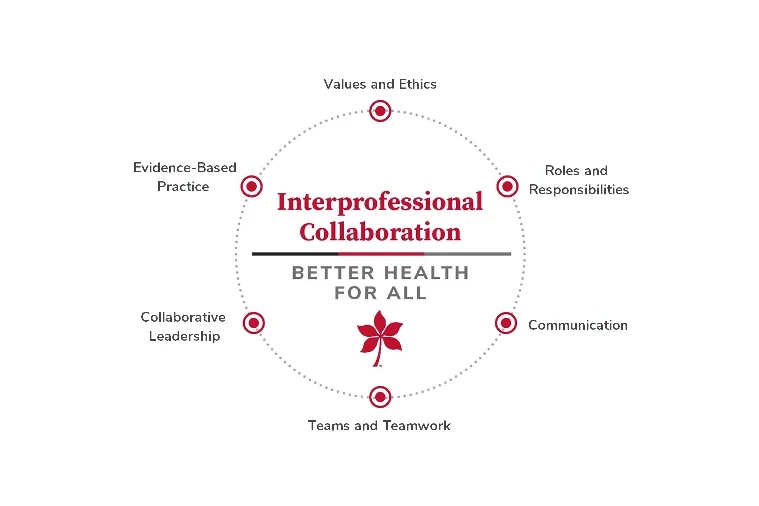BuckIPE Competencies
BuckIPE Framework
BuckIPE is a comprehensive interprofessional education framework developed collaboratively by representatives from Ohio State’s health science colleges, Social Work, and Arts and Sciences. Initiated in 2018 through a vision report by curricular deans and advanced under the leadership of Dr. Andrea Pfeifle since 2020, the framework is built around six core competencies—four from the Interprofessional Education Collaborative (IPEC) and two additional ones identified by faculty and deans. Each competency includes measurable learning outcomes aligned with U.S. and Canadian interprofessional education standards, supporting learners in developing the skills essential for collaborative practice across disciplines.

Values and Ethics (VE)- Work with team members to maintain a climate of shared values, ethical conduct, and mutual respect.
- VE1. Promote the values and interests of persons and populations in health care delivery, One Health, and population health initiatives.
- VE2. Advocate for social justice and health equity of persons and populations across the life span.
- VE3. Uphold the dignity, privacy, identity, and autonomy of persons while maintaining confidentiality in the delivery of team-based care.
- VE4. Value diversity, identities, cultures, and differences.
- VE5. Value the expertise of health professionals and its impacts on team functions and health outcomes.
- VE6. Collaborate with honesty and integrity while striving for health equity and improvements in health outcomes.
- VE7. Practice trust, empathy, respect, and compassion with persons, caregivers, health professionals, and populations.
- VE8. Apply high standards of ethical conduct and quality in contributions to team-based care.
- VE9. Maintain competence in one’s own profession in order to contribute to interprofessional care.
- VE10. Contribute to a just culture that fosters self-fulfillment, collegiality, and civility across the team.
- VE11. Support a workplace where differences are respected, career satisfaction is supported, and well-being is prioritized.
Roles and Responsibilities (RR)- se the knowledge of one’s own role and team members’ expertise to address health outcomes.
-
RR1. Include the full scope of knowledge, skills, and attitudes of team members to provide care that is person-centered, safe, cost-effective, timely, efficient, effective, and equitable.
-
RR5. Practice cultural humility in interprofessional teamwork.
-
RR4. Differentiate each team member’s role, scope of practice, and responsibility in promoting health outcomes.
-
RR3. Incorporate complementary expertise to meet health needs including the social determinants of health.
-
RR2. Collaborate with others within and outside of the health system to improve health outcomes.
Communication (CC)-Communicate in a responsive, responsible, respectful, and compassionate manner with team members.
-
CC1. Communicate one’s roles and responsibilities clearly.
-
CC7. Examine one’s position, power, hierarchical role, unique experience, expertise, and culture towards improving communication and managing conflicts.
-
CC6. Use constructive feedback to connect, align, and accomplish team goals.
-
CC5. Practice active listening that encourages ideas and opinions of other team members.
-
CC4. Promote common understanding and teamwork towards shared goals.
-
CC3. Communicate clearly with authenticity and cultural humility, avoiding discipline-specific terminology.
-
CC2. Use communication tools, techniques, and technologies to enhance team function, well-being, and health outcomes.
Teams and Teamwork (TT)- Apply values and principles of team science to adapt one's own role in a variety of team settings.
-
TT1. Describe evidence-informed processes of team development and practices.
-
TT10. Discuss organizational structures, policies, practices, resources, access to information, and timing issues that impact the effectiveness of the team.
-
TT9. Operate from a shared framework that supports resiliency, well-being, safety, and efficacy.
-
TT8. Facilitate team coordination to achieve safe, effective care and health outcomes.
-
TT7. Share team accountability for outcomes.
-
TT6. Reflect on self and team performance to inform and improve team effectiveness.
-
TT5. Apply interprofessional conflict management methods, including identifying conflict cause and addressing divergent perspectives.
-
TT4. Use shared leadership practices to support team effectiveness.
-
TT3. Practice team reasoning, problem-solving, and decision-making.
-
TT2. Appreciate team members’ diverse experiences, expertise, cultures, positions, power, and hierarchical roles towards improving team function.
Evidence-Based Practice (EVP)- Utilize evidence to inform all aspects of interprofessional teamwork.
-
EBP1. Use available evidence to inform effective teamwork and team practices.
-
EBP2. Explain relevant evidence to patients/clients/families/communities and other members of the interprofessional team for use in shared decision-making.
Collaborative Leadership (CL)- Engage members of the interprofessional team, including individuals and communities, in collaborative leadership.
-
CL1 Employ leadership practices that support interprofessional collaborative practice and team effectiveness.
-
CL3. Support shared leadership appropriate to the situation.
-
CL2. Incorporate individual preferences in collaborative decision-making.
